
Marcus Aurelius was the emperor of Rome from 161-181 A.D., and his writings are a major source for our contemporary understanding of Stoic philosophy. His most famous work, Meditations, wasn’t written to be a published book, though. Instead, it consists of writing that he used for his own self-improvement and guidance. Still, so many Marcus Aurelius quotes stem from that now-famous personal journal.
As the last of the Five Good Emperors, the second to last emperor of Pax Romana, a leader of victorious war efforts, and perhaps the most famous of the Stoic philosophers, there are a lot of good reasons to take his perspectives on life, death, and everything in between to heart.
If you're seriously interested in improving yourself and your life, there is a lot of wisdom to be found in the words of Marcus Aurelius. His musings are profound in themselves, but their ability to stand the test of time over the course of nearly two thousand years only accentuates their validity.
While Meditations is certainly worth a read if you’re committed to pursuing a life of virtue, familiarizing yourself with the quotes of this truly impressive man can be a great introduction to his thinking and approach to life.

The origin of Stoic philosophy preceded Marcus Aurelius by several centuries, but that didn’t stop it from having a profound influence over his life (and, one could argue, the course of world history.)
As this philosophy was the greatest intellectual interest of Aurelius, you can find in his writings over and over again the Stoic ideas of exercising reason, fate, and self-restraint in life. Through the exploration of these concepts, he points towards how one can lead a life that is truly virtuous, happy, and good.
"Our life is what our thoughts make it."
-Marcus Aurelius
It can be tempting to understand our own lives as a series of fixed events that happen to us that can only be interpreted in one way. Maybe we walk around with a sense that we’ll never be able to be successful because of circumstances that occurred in our childhood, or we expect that we are fated to some kind of unfulfilling life for one reason or another.
One of the most effective changes you can make in your attitude towards yourself and your life is to realize that if you expect that you’re going to fail, you probably will. If you expect that your life will be ruled by past trauma, then it likely will be. By viewing your own life in a negative light, you are in effect creating the reality where your experience will be quite disappointing.
What this means, though, is that it actually might be possible to change yourself for the better and correct the course of your life by simply changing your thoughts. To be clear, this isn’t a prescription to simply repeat affirmations about becoming rich and then waiting around to win the lottery without even buying a ticket.
If the idea that your thoughts create your reality seems a bit farfetched to you, consider just entertaining the idea in your own mind for a while. What if you expected that you will live a good life and you will achieve the goals you desire? What if that expectation actually facilitated your dreams coming true?
When you think about it, there is hardly much harm in trying this approach to life on for size. The next time you get upset by a life circumstance, no matter how small or large, try to zoom out and consider other ways that you could think about the situation that leaves you experiencing less pain and discomfort. You never know, it might just be crazy enough to work– and fundamentally change your life for the better.
"At day's first light have in readiness, against disinclination to leave your bed, the thought that "I am rising for the work of man."
-Marcus Aurelius
Even Roman emperors don’t always feel like getting out of bed in the morning. To help counteract the temptation to hit the snooze button and drift back off into the dream world, Aurelius suggests that you immediately remind yourself of the fact that you are doing the work you were destined to do. He goes on to ask if lying “under the blankets and keep[ing] myself warm” is really “the purpose of my creation.”
If you struggle to face the day, try to remind yourself right away of your greater purposes and the part you play in the story of existence. In Aurelius’ view, it’s “Nature’s bidding” that you do your share of the work to do your “part towards a coherent world order.”
"Do not waste what remains of your life in speculating about your neighbors, unless with a view to some mutual benefit. To wonder what so-and-so is doing and why, or what he is saying, or thinking, or scheming -- in a word, anything that distracts you from fidelity to the ruler within you -- means a loss of opportunity for some other task."
-Marcus Aurelius
It's easy to focus more on what's going on with the people around you than it is with yourself. While it's all too human to get caught up in the drama of what other people are up to and what they might think of you, Aurelius rightfully argues that this represents a major opportunity cost in one's life.
If you find yourself spending a lot of time focusing on other people, whether through judgment or admiration, consider stepping back and centering in yourself. What do you really want to do with your life? How do you really want to spend your time?
There's a good chance that the answer isn't gossiping, judging, or fixating on others. In all likelihood, you have goals and dreams that you want to accomplish that can only be reached through your own deliberate action. If you catch yourself getting caught up in the whirlwind of other people, their problems, and their opinions, remind yourself that you are choosing to spend your precious, finite time in a way that most likely doesn't benefit you in any way.
"Live a good life. If there are gods and they are just, then they will not care how devout you have been, but will welcome you based on the virtues you have lived by. If there are gods, but unjust, then you should not want to worship them. If there are no gods, then you will be gone, but will have lived a noble life that will live on in the memories of your loved ones."
-Marcus Aurelius
In just a few sentences, Marcus Aurelius offers a pretty bomb-proof way to justify living a virtuous life. He breaks down the potentials of metaphysical reality as having only three possibilities: there are gods and they are just, there are gods and they are unjust, and there are no gods.
Whatever happens after you die, whatever the true meaning of life is, Aurelius argues that living a good life is the answer no matter what. Checkmate, nihilists!
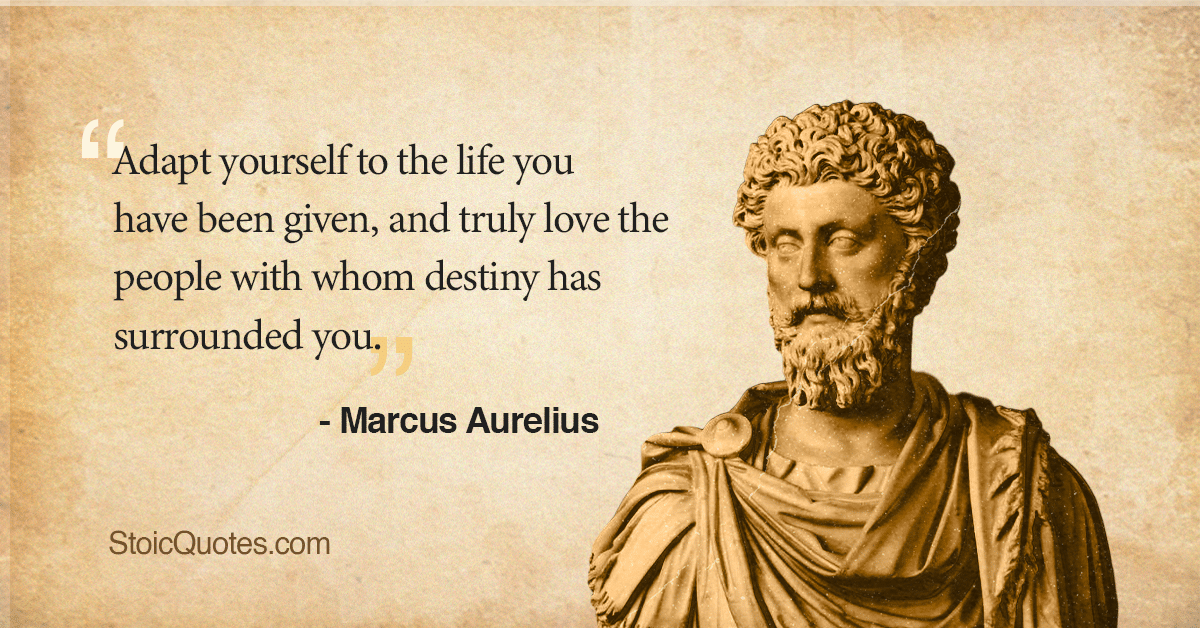
When Marcus Aurelius speaks of love, he is typically speaking of a deep and unashamed appreciation for the people in one’s life as well as nature and the universe. While you might think of Stoicism as a philosophy that promotes living a life free from emotions, this is certainly not where Aurelius was coming from. The idea of love in his writing puts forward the notion that to truly love is one of the great joys and blessings of life, while at once accepting the potential for change and loss in one’s life.
"Adapt yourself to the life you have been given, and truly love the people with whom destiny has surrounded you."
-Marcus Aurelius
In the modern world, it’s possible that we simply have so much choice that it’s paralyzing. Theoretically, you can live wherever you want to live, be whoever you want to be, and pair up with whoever you want to pair up with.
While there’s nothing wrong with having ambition, in fact, Aurelius states that “a man’s worth is no greater than the worth of his ambitions,” leading a happy and loving life requires that you be realistic about the life that you currently have.
Aurelius speaks of a greater order to the world in the form of destiny. The life you have is one you’ve been given, and the people around you have been put there for a reason. When you look at life this way, it can radically change your relationships and your life for the better.
Ultimately, it’s easy to dream about the perfect partner, the perfect family, and the perfect friends. The hard work is where the real jewel is, though, and by learning to love those around you the result might just be genuine fulfillment.
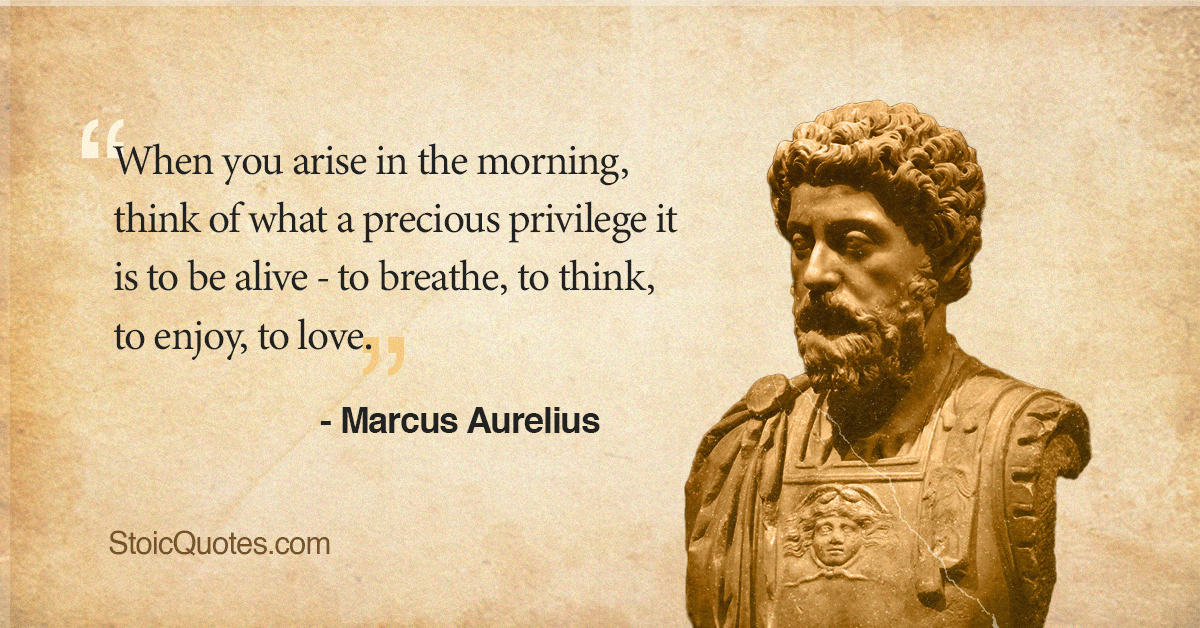
"When you arise in the morning, think of what a precious privilege it is to be alive - to breathe, to think, to enjoy, to love."
-Marcus Aurelius
In one of the most famous Marcus Aurelius quotes, we’re given a particularly refreshing take on being alive. In a culture where everyone seems to be vying to the highest slot on the victim totem pole, it can be pretty life-changing to consider simply be grateful for the opportunity to participate in the finite experience called life.
If you find yourself constantly complaining that you got dealt a bad hand, consider doing a 180-degree turn in your thought process. Rather than thinking about what you don’t have or who you’re not, try to meditate on the miracle that is existence when you first awake.
"Not to display anger or other emotions. To be free of passion and yet full of love."
-Marcus Aurelius
There are some pretty important hairs to split when it comes to what it really means to live by a Stoic philosophy. While our modern understanding can sometimes translate into being emotionless, it's actually quite a bit more complicated than that.
How can one be free of passion and yet full of love? How can one be full of love without displaying emotions?
The love that Aurelius speaks of is one that is deep and profound. It is an appreciation and understanding for all things in life and the cosmos, including loss and pain. When you can hold a holistic view of the universe in your mind, you can see how there cannot be joy without sorrow, and you cannot gain without having lost.
In this quote, the notion of passion is short-sited and impulsive, whether it be the passion of anger or the passion of lust. He isn't advocating for denying your humanity and living like a rock or a computer. In fact, he is proposing that one delve deeply into the experience of reality with a profound love instead of a reactive emotionality.
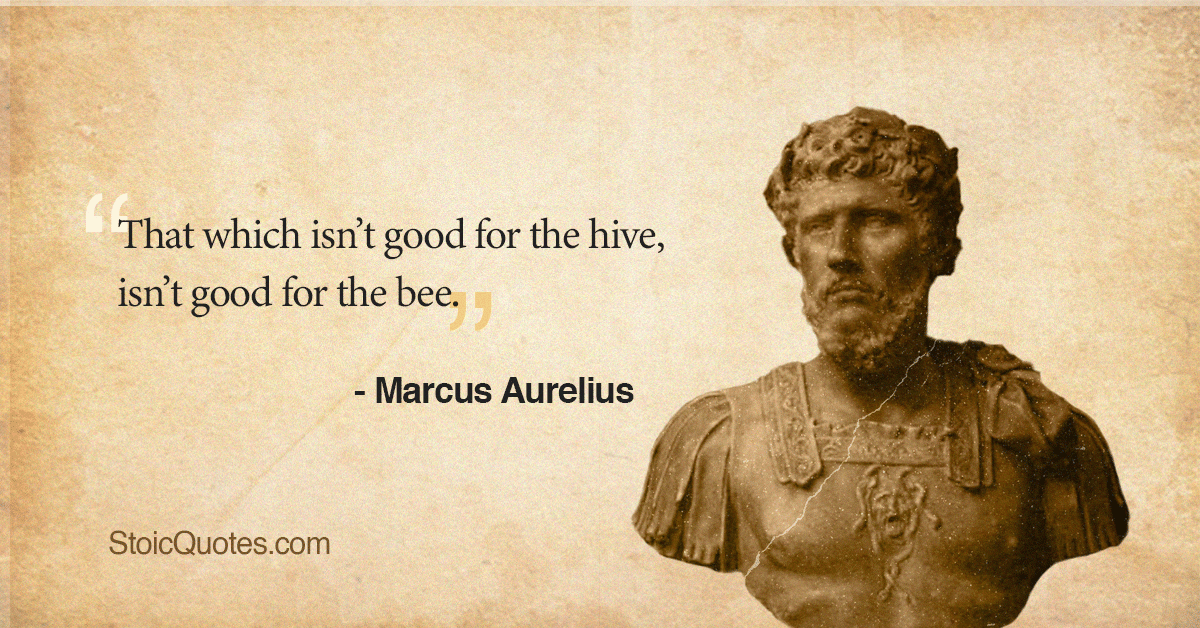
When we think of philosophers, we often picture a wispy, pale man that lives exclusively in his mind. Marcus Aurelius, however, was not just a profound thinker hidden away in a dusty room filled with books far from the harsh truths of physical reality. As an emperor and a respected leader, his thoughts on being in a position of power are worth integrating into your life for all who desire to live virtuously.
"It is the responsibility of leadership to work intelligently with what is given, and not waste time fantasizing about a world of flawless people and perfect choices."
-Marcus Aurelius
It doesn’t matter whether you find yourself leading a giant multinational company or your group of friends when you’re taking a canoe trip. Being realistic about the nature of humans is essential to good leadership. If you spend your time dreaming of a utopia that involves people being fundamentally different than they are, Aurelius would argue that you’re frittering away precious time when true action could be taken.
"Make sure you’re not made ‘Emperor,’ avoid that imperial stain. It can happen to you, so keep yourself simple, good, pure, saintly, plain, a friend of justice, god-fearing, gracious, affectionate, and strong for your proper work."
-Marcus Aurelius
While there is something unquestionably attractive about being in a position of power, Aurelius warns that actually obtaining control over others can be more of a curse than a blessing. In this quote, the philosopher argues that the ego-trip of power can take you away from the true work of man. If you find yourself desiring to be in a position of leadership over others, ask yourself whether you can honestly maintain the humility he describes above.
"That which isn’t good for the hive, isn’t good for the bee."
-Marcus Aurelius
Being a leader shouldn’t be about personal profit or fame. No matter what you do, no matter who you are, you can’t escape the reality that you are just as human as those that you are leading. If something isn’t good for the people that trust in your guidance, it won’t be good for you either, even if it takes some time for the feedback loop to complete itself.
"No matter what anyone says or does, my task is to be good."
-Marcus Aurelius
When you’re in a position of leadership, other people will gravitate towards you for reasons both good and bad. Don’t let the influence of others convince you that you no longer have to remain principled and committed to living a good life even if you are seated at the very top of a hierarchy. The goal of any great leader should be to stay steady of the path of good and rightful action, no matter how much power they yield over others.
"Let men see, let them know, a real man, who lives as he was meant to live."
-Marcus Aurelius
It’s pretty difficult to imagine a political leader in this day and age that feels this way. So much of the political arena these days is just a big marketing campaign, and the image of those in the public eye is carefully curated. Whether you’re a parent, a manager, a CEO, or the president of a small nation, there is infinite wisdom in the advice to allow people to really know who you are and lead by example.
After all, when you’ve worked to make changes for the better in who you are, how did they come about? Did they come about because someone preached to you who you should be, or because you witnessed someone living in a way that you felt compelled to emulate? Leading by example is a much more effective way to create positive change in the world around you, rather than proselytizing about how you think everyone else should be.
"The impediment to action advances action. What stands in the way becomes the way."
-Marcus Aurelius
Believe it or not, obstacles can actually be the thing that propels you forward in your career, your relationships, and your life. Rather than getting shut down by all the stuff that pops up to block your path, learn to understand impediments as essential tools for achieving your goals.
While this might seem contradictory, you’ve likely experienced this phenomenon in your own life. If you’ve ever overcome an obstacle to reach a goal, you know that the struggle in climbing over that wall taught you priceless lessons that helped you become the person you are now and further refine what it is that you want to achieve in life.
It's easy to think about life as a series of fixed happenings. You graduate from high school, you go to college, you begin a career, you get married and start a family. While there's nothing wrong with having a map of your future, it's important to understand that you're going to encounter things along the way that might just fundamentally change the direction you're heading in.
As the simplest of examples, let's say that you are taking a run on some nature trails near your house. During a storm the previous night, however, the path you always take has become problematically flooded. What do you do-- do you turn around, do you try to bushwhack through the woods around the path, or do you change your route on the fly and explore a part of the woods you've never been to before?
If you chose either option two or three, the impediment to your action actually advanced your action. You likely experienced a new and rejuvenating headspace, too, either navigating through the woods without a trail or running down a path you'd never considered exploring before.
The cycles of change in life and in the cosmos were a major focus for Marcus Aurelius in his writings. If you can alter the way that you understand the nature of change and the role that it plays in creating reality, you might just feel in yourself a profoundly positive change.
"Loss is nothing else but change, and change is Nature’s delight."
-Marcus Aurelius
It’s easy to get comfortable in life and be resistant to any change that comes our way. It can be particularly difficult to deal with the change that accompanies loss. As always, Aurelius offers a more zoomed-out perspective that can help to alter the way you look at the losses you’ve experienced in life.
If you can tap into the reality that change is a beautiful product of nature, and the fact that loss is only the experience of change, you can find peace and acceptance in even the most heartbreaking of life occurrences.
"Observe constantly that all things take place by change."
-Marcus Aurelius
As humans, we tend to be a bit discriminatory when it comes to change. If something happens to us that changes our life for the better, we don’t necessarily think of it as a big change, but rather the result of our good luck, our hard work, or both. When things seemingly change for the worse, though, we are devastated by the alteration to our experience.
One of the major themes of Aurelius’ writing echoes the famous quote of the ancient Greek philosopher Heraclitus of Ephesus: “the only constant in life is change.” If we can learn to embrace change and avoid labeling it as either good or bad, we can benefit from the delightful energy of nature.
"If someone is able to show me that what I think or do is not right, I will happily change, for I seek the truth, by which no one was ever truly harmed. It is the person who continues in his self-deception and ignorance who is harmed."
-Marcus Aurelius
It’s easy for us to get attached to certain ideas or ways of being. Indeed, if we’re honest with ourselves, we’ve all likely had an experience where someone pushes back on our actions or way of thinking and our immediate reaction is to be defensive.
Not only does Aurelius promote the idea that one should accept and welcome change from outside of oneself, but he also argues that one should be willing to make changes within oneself. Rather than clinging to our egos and our sense of identity, what if we were guided by the search for truth and the desire to live a virtuous and good life?
If you can see yourself as a being that is ever-evolving rather than a fixed entity, it’s possible to actually embrace constructive criticism in a way that improves your life and helps you live well.
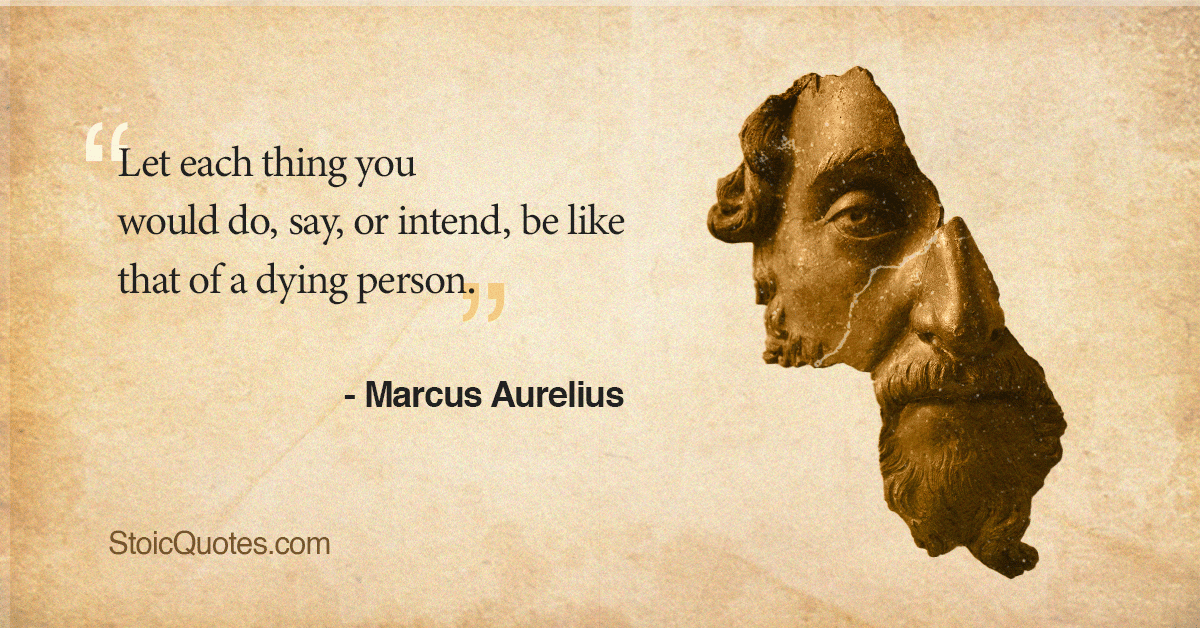
Aurelius understands death as just another iteration of change in life and the universe. In his thinking, death does not need to be something that you fear, but rather something that motivates you to live the best life. This is the case no matter what you believe happens when we die– whether we are annihilated or our spirits continue on in another form.
"About death: Whether it is a dispersion, or a resolution into atoms, or annihilation, it is either extinction or change."
-Marcus Aurelius
In this quote, Marcus Aurelius offers an antidote to the fear of death. He posits that there are really only two possibilities when it comes to what happens after we die. We can either cease to be, or we can change into another state.
As discussed previously, Aurelius is a whole-hearted proponent of accepting and even welcoming change. From this view, neither of the potential outcomes of the end of our earthly life are worth fearing.
"Let each thing you would do, say, or intend, be like that of a dying person."
-Marcus Aurelius
It’s easy to get caught up in the emotions and dramas of everyday life. However, when a person knows that they will soon die, it seems that there is often a major shift in perspective.
One exercise that is helpful for embracing this quote is picturing yourself on your death bed many decades from now. While this might sound morbid, it can actually help you determine what your priorities are and what really matters to you.
As you picture yourself near to death, what do you want to look back on your life and have accomplished? Who do you want to have been, and who do you want to have spent your life with? Asking these questions from the perspective of only having life behind you, rather than also ahead of you, can help you ground to the actions you need to take to be the person you want to be.
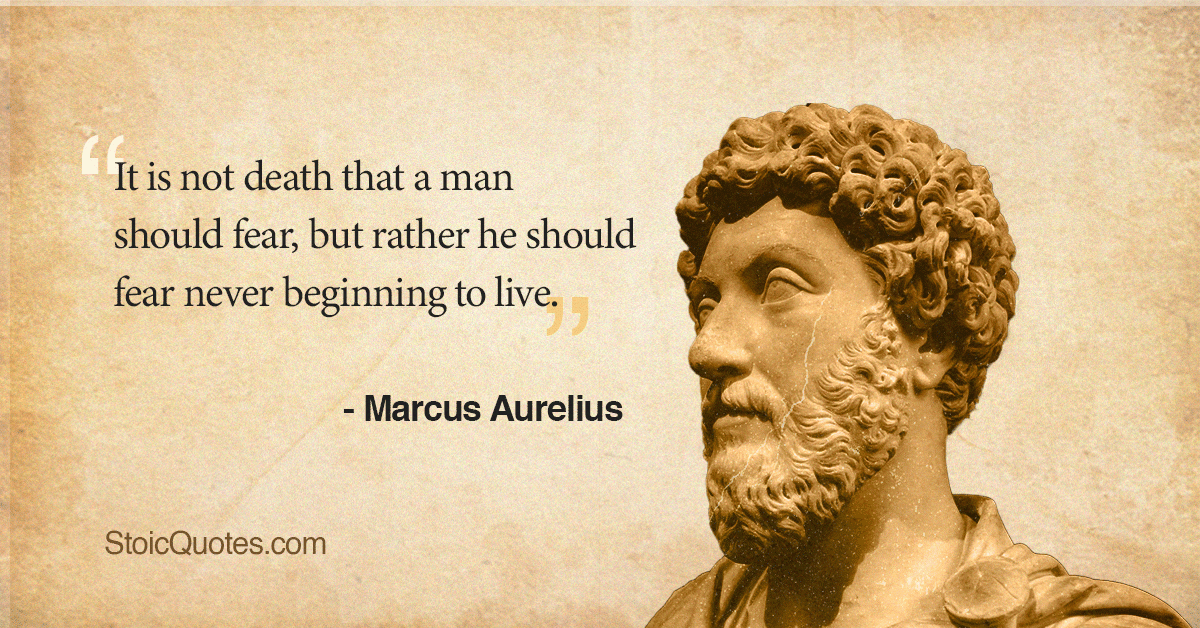
"It is not death that a man should fear, but rather he should fear never beginning to live."
-Marcus Aurelius
You can certainly live your whole life trying to avoid taking risks so that you’ll live as long as possible. But what will you sacrifice along the way?
There’s a good chance you’ve encountered individuals who have taken this exact approach to life. The fear of death can leave you to settle into mundanity in a way that doesn’t even really feel like living at all. Rather than focusing so much on the fact that you will one day die, consider shifting your attention to how you can live your best life today, even if that means leaping into the great unknown.
In modern terms, the idea that your thoughts create your reality might come off as reeking of the most shallow of New-Age notions. However, when you hop into the thoughts of the great leader and thinker Marcus Aurelius, you are able to interact with this concept without abandoning reason or rationality. In fact, it all starts to seem so self-evident that it rings of the truth that Aurelius holds in such high regard.
In another profound Aurelius quote, he states that “it never ceases to amaze me: we all love ourselves more than other people, but care more about their opinions than our own.” What if you were able to take your own life seriously instead of living your life for the affirmation of others? What if you were to change your thoughts in a way that led to a happier life, virtuous action, and the ability to truly love those around you, your experience, and the whole of the universe?
Stoicism can rightfully be seen as a powerful antidote to some of the vices and nihilistic philosophies so prevalent in our modern world. The work of Marcus Aurelius is a tremendous place to begin on your journey into the world of Stoic philosophy, but there are many more great thinkers and ideas to engage with in this rich universe of ideas. For more practical and life-changing Stoic notions, check out our ever-expanding library of resources at StoicQuotes.com.
We encourage you to share this article on Twitter and Facebook. Just click those two links - you'll see why.
It's important to share the news to spread the truth. Most people won't.